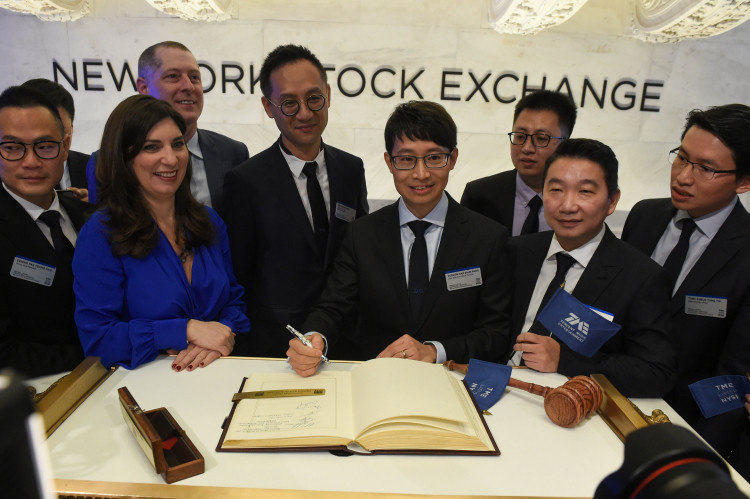Tencent Music Entertainment shares rose at $14.10, up 8 percent its initial public offering of $13 per share.
This immediately pushed the company to a market capitalization of nearly $23 billion, not very far with the current valuation of its Swedish counterpart, Spotify, according to Reuters.
Tencent Music Entertainment generated nearly $1.1 billion in its IPO, the company announced on Dec 11. It began trading on the New York Stock Exchange on Wednesday.
The company said it priced its American Depository Receipts at the lowest range it indicated in its filing with the Hong Kong stock exchange, between $13 and$15 per share.
Before its debut, U.S. listings by Chinese companies only raised $7.9 billion in accumulated value, according to Reuters.
Tencent Music Entertainment U.S. IPO is the highest amount generated since 2014 when Alibaba Group Holdings generated a record of $25 billion IPO. It's the fourth largest among Chinese companies this year with regard to deal value. iQiyi Inc had $2.4 billion listing. Pinduoduo Inc followed with $1.6 billion and electric vehicle maker NIO Inc was third with $1.15 billion.
Morgan Stanley & Co. LLC, Goldman Sachs (Asia) L.L.C., J.P. Morgan Securities LLC, Deutsche Bank Securities Inc., and Merrill Lynch, Pierce, Fenner & Smith Incorporated are acting as joint book runners of this offering.
Credit Suisse Securities (USA) LLC, China International Capital Corporation Hong Kong Securities Limited, Allen & Company LLC, BOCI Asia Limited, China Renaissance Securities (Hong Kong) Limited, HSBC Securities (USA) Inc., KeyBanc Capital Markets Inc., and Stifel, Nicolaus & Company, Incorporated are acting as co-managers.
Tencent Music intended to debut on October but erratic market developments due to the ongoing China-US trade has delayed its plan until Dec. 11.
October was supposed to be a good timing as the company reported a 244 percent increase in profits, $394 million, for January to September.
Nonetheless, the company's IPO proved to be a success. Not even a lawsuit before its IPO hampered the company's success.
Ahead of its debut in the U.S., the company was accused of using misinformation's, threats and intimidation by its former investor Hanwei Guo. He alleged that Tencent Music coerced him to sell his equity stakes in Ocean Music. After he sold his stakes, Ocean Music became part of TME following the merger between Tencent's QQ and China Music Corporation in 2016.
Han demands Tencent Music to reimburse even with percentages of his equity stakes as compensation for his economic loss.






